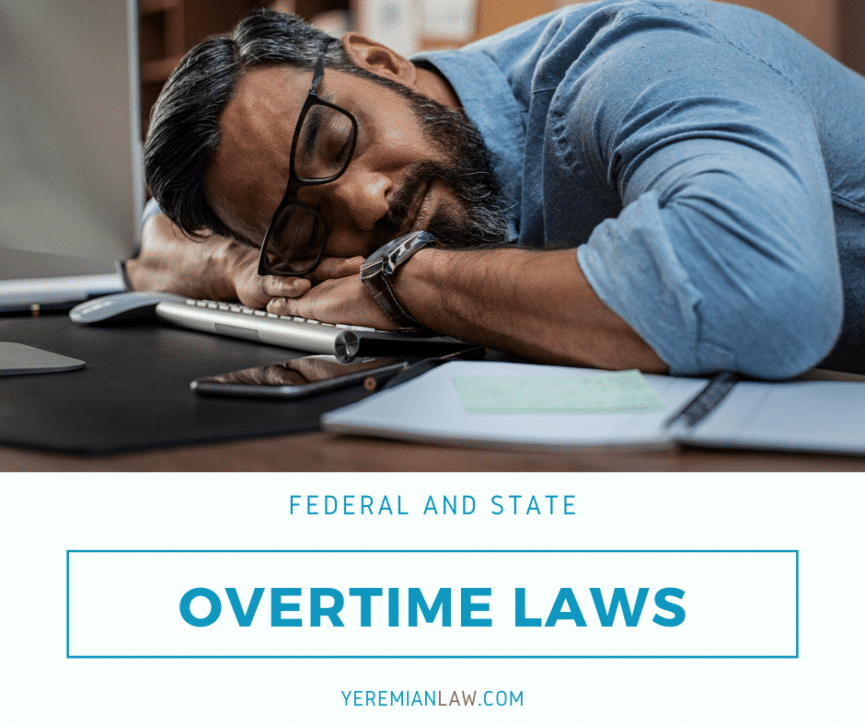If you’re an hourly worker in California, you need to know about overtime laws – what they are, which workers they protect, and who’s exempt from overtime law protections. This guide walks you through federal overtime laws, such as the Fair Labor Standards Act, and California’s state laws.
What Are Overtime Laws in the U.S.?
Is overtime required by law? Yes – federal and state laws require employers to pay workers overtime unless those workers are exempt.
The Fair Labor Standards Act, or FLSA, says that workers are entitled to overtime pay for hours worked in excess of 40 in one workweek. Overtime pay equals 1.5 times the worker’s regular rate of pay, which means if your hourly wage is $20, your overtime pay is $30 per hour.
Related: California overtime laws for hourly workers

What is the New Overtime Rule for 2020?
In September 2019, the Department of Labor issued a new overtime rule for 2020. Under the new rule:
- Workers who don’t earn at least $35,568 per year (which equals $684 per week) must be paid overtime, even if they’re classified as a manager or a professional
- Nondiscretionary bonuses and incentive payments can be used to satisfy up to 10 percent of the standard salary level
The duties tests haven’t changed, though – those remain the same. An employee’s job duties must still primarily involve executive, administrative or professional duties as defined by the original regulations in order for that employee to be considered exempt.
Related: California employment law basics

What Are the Exemptions for Overtime Pay?
If you earn over $107,432 per year, you’re exempt from overtime pay (as long as you earn $684 weekly on a salary or fee basis) – but only if you regularly perform at least one duty of an exempt executive, administrative or professional employee. Also, some of these workers are often exempt from FLSA overtime protections:
- People working for some seasonal amusement or recreational establishments
- Employees of certain small newspapers and switchboard operators of small telephone companies
- Seamen working on foreign vessels
- Workers engaged in fishing operations
- Newspaper delivery personnel
- Farm workers who are employed on small farms
- People employed as companions to the elderly or infirm, as well as casual babysitters
- Some commissioned employees of retail and service businesses
- Auto, truck, trailer, boat, aircraft, or farm implement parts salespersons who are employed by establishments that don’t manufacture their own vehicles or components
- Auto, truck or farm implement parts clerks and mechanics who are employed by establishments that don’t manufacture their own vehicles or components
- Railroad and air carrier employees, taxi drivers, some employees of motor carriers, seamen on American vessels and local delivery employees who are paid on approved trip rate plans
- Announcers, chief engineers and news editors of some non-metropolitan broadcasting stations
- Domestic service workers who live with their employers
- Employees at movie theaters
- Farm workers
However, this isn’t always the case. If you’re employed in one of these jobs, you may or may not be eligible for overtime pay.

What Are Exempt Job Duties?
In addition to earning a certain salary, employees must also perform “exempt job duties” if employers don’t want to pay them overtime. The duties of an exempt employee must be executive, administrative or professional. That can include things like:
- Managing
- Directing the work of at least two other full-time employees (or their equivalent)
- Having the authority to hire or fire other employees
- Performance of office or non-manual work directly related to a business’s operations
- The exercise of discretion and independent judgment on important matters
Note that clerical work is not exempt – secretaries and administrative assistants are usually not exempt workers and are still entitled to overtime protections.
What Are the Overtime Rules for Hourly Employees?
Hourly employees who aren’t exempt from overtime rules are entitled to time-and-a-half for every hour over 40 hours in one workweek or every hour over 8 in one day. Employees are entitled to overtime pay for other things, too. Here’s a chart that explains what employers must pay.
| Hours Worked | Pay Rate |
| 8 or more in one day | 1.5 times the hourly rate |
| 40 or more in one workweek | 1.5 times the hourly rate |
| 7th consecutive day in one workweek | 1.5 times the hourly rate |
| 12 or more per day | 2 times the hourly rate |
| Over 8 hours on the 7th consecutive day in a workweek | 2 times the hourly rate |
Does California Require Overtime After 8 Hours?
The state of California requires employers to pay employees an overtime rate after working 8 hours in one day. Not all states require this, though – California has exceptional worker protections that often even exceed federal laws.

Is Overtime Required by Law?
For nonexempt hourly employees – those that are protected under the Fair Labor Standards Act – overtime is required by law. Employers must pay it when an employee works 8 or more hours in one day or 40 or more hours in one workweek, according to FLSA. And in California, employers have to pay overtime pay to workers who are on their 7th consecutive day in one workweek. If an hourly, nonexempt worker has worked 12 or more hours in one day, or more than 8 hours on the 7th consecutive day in one workweek, California law requires that person’s employer to pay double time. Double time is twice the employee’s standard wage. For example, if your hourly rate is $20, and you work hours that qualify you for double time pay, your employer must pay you $40 per hour for those hours.
Here’s a real-world example:
If you work 14 hours in one day, your employer pays you your regular rate of $20 per hour for the first 8 hours you work. That totals $160.
Your employer must pay you 1.5 times your regular rate of pay for every hour you work over 8 hours, up to 12 hours (when double time kicks in). That’s 4 hours, so your employer must pay you $30 per hour for that time, which totals $120.
You still worked 2 additional hours after working 12 hours, which qualifies you for double time. Those additional 2 hours are worth $40 each, so that’s $80 in total.
When you add up your pay for a 14-hour day, which is $160 + $120 + $80, you’re entitled to $360 for that day’s work.
Related: How does overtime work in California?

Do You Physically Have to Work 40 Hours to Get Overtime?
Employers don’t count holiday leave, sick leave or vacation time toward your hours worked. You must really work all 40 hours, and then additional hours, to qualify for overtime pay. That means if you normally work from 9 a.m. to 5 p.m., but you take Monday and Tuesday off, the hours you would normally work do not count toward your overtime – even if your schedule never changes. They’re not considered “hours” when it comes to FLSA, and they don’t qualify you for additional pay. You do have to physically work 40 hours to get overtime.
How Can Employers Avoid Paying Overtime?
“How can I avoid paying overtime legally?” A lot of people ask attorneys this question – and the bottom line is that the best way to avoid paying overtime, legally speaking, is to avoid having your hourly workforce work more than 8 hours in a day or more than 40 hours in a week.
Employers don’t have to pay overtime to salaried workers, either.
Do You Need to Talk to an Attorney About Overtime Laws?
If you believe your employer owes you money for hours you worked, based on overtime laws at the federal or state level, we may be able to help you recover it. Failing to pay employees overtime is a form of wage theft, and employers are legally obligated to pay their workers overtime wages when the employee’s hours qualify for additional pay.
Call us at 818-230-8380 now to talk to a Glendale and Los Angeles employment lawyer about overtime laws and how they apply to you – we can help.




